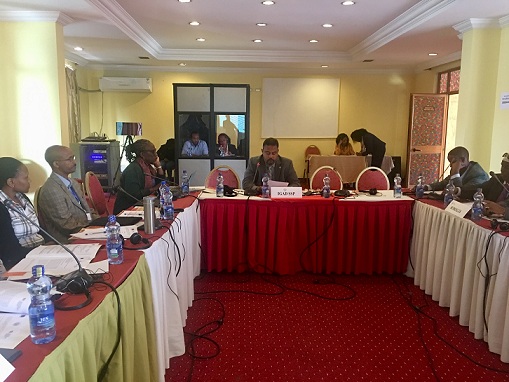
13 June 2019, (Bishoftu, Ethiopia): IGAD Security Sector Program (IGAD SSP), with support from the European Union Trust Fund (EUTF) through the Austrian Development Agency (ADA) under the IPPSHAR program, conducted a three days training on “Implementing Human Rights Standards in Preventing, Investigating, and Prosecuting Terrorism Cases” for all IGAD Member States on 10-12 June 2019 in Bishoftu, Ethiopia.
The IGAD region is a source, transit, and final destination of wide range of Transnational Security Threats (TSTs). One of these threats is terrorism, which threaten all IGAD Member States. Faced with these threats and its consequences, States have a duty to protect individuals under their jurisdiction. They are under the obligation to prevent terrorist acts and bring those responsible for them to justice. In doing so, however, they must respect human rights and fundamental freedoms, as identified in the United Nations Global Counter Terrorism Strategy under Pillar IV. Indeed respect for human rights and fundamental freedoms are an essential element of any counter terrorism strategies. It is with this background in mind that this training was organized and undertaken. The training made an in-depth discussion on the link between human rights and prevention, investigation, and prosecution while handling terrorism cases. In addition, it explored and shared good practices among the Member States with their experiences and the roles they play on prevention, investigation, and prosecution of terrorism in line with international human rights standards.
The training was officially opened by Commander Abebe Muluneh, Director of IGAD Security Sector Program (IGAD SSP). Commander Abebe welcomed all the participants and expressed his appreciation to the Government of Ethiopia for hosting. In his welcoming remark, he highlighted on the threat that terrorism poses on peace, human security, social and economic development, among others. He further stressed the importance of human rights and the available international consensus through the United Nations Security Council Resolutions in relation to upholding human rights standards. He reiterated the recent call of the Council underscoring that “effective Counter Terrorism measures and respect for human rights, fundamental freedoms, and the rule of law are complementary and mutually reinforcing, and constitute an essential part of successful Counter Terrorism efforts”.
The overall objective of the training was to strengthen Member States’ capacity to effectively utilize and implement the international human rights standards in handling terrorism cases of prevention, investigation, and prosecution. Specifically, the training aimed to contribute to:
- familiarize practioners with fundamental human rights standards they are obliged to adhere to
- explore the challenges that Member States face in balancing Counter Terrorism measures and respect to human rights and fundamental freedoms
- make an in-depth analysis of international frameworks and compare it with the national and regional legal regimes
- identify how acts of terrorism can be countered in ways that uphold human rights standards
- explore how the international human rights framework is applicable in dealing with the terrorist threat, from addressing its causes, to dealing with its perpetrators, to protecting its victims, to limiting its consequences
About 35 representatives from all IGAD Member States drawn from relevant institutions such as the Police, Judiciary, Ministry of Foreign Affairs, Ministry of Justice, Ministry of Interior, Human Rights Commission and National Counter Terrorism Centers participated in this training. Regional experts, namely; Dr. Dereje Zeleke, Assistant Professor at the Addis Ababa University, and Dr. Florence J. Simbiri, Professor at the University of Nairobi shared their experiences and facilitated the training through interactive discussions, case studies, and group work exercises that were believed to achieve the required result of the training.
..ஜஜ۩END۩ஜஜ…